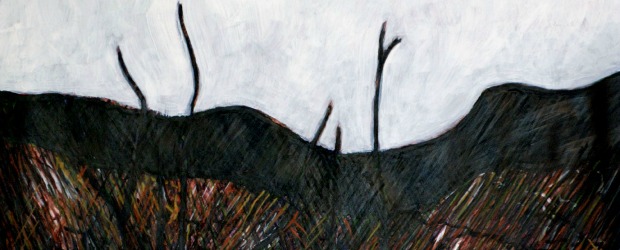You have no items in your cart. Want to get some nice things?
Go shopping
There were two sandstone hills rising above the flood plain. The Ice Age had razed everything but those hills. They withstood the great glacial motion, the thaw that took so much out into the ocean. What remained was alluvial soil, so fecund that it was said to be the richest soil in the country. We heard all this in Geography when we learned about the shape and size and quality of the land where we lived.
I knew from an early age the earth was good. I felt the black grains of soil slide through my fingers when I scooped up a handful in the garden. ‘I shall need a good worker like you in my garden,’ Samuel next door said.
I was learning about Samuel the son of Ruth at school. Of all the Bible stories the stories of Samuel and Ruth fascinated me. I thought of Ruth, toiling in the fields at harvest. I thought of Samuel summoned by the Lord. Samuel our neighbour called his daughter Ruth.
Ruth bore a strong family resemblance to her aunt, the town’s senior librarian. She helped me choose books. I wanted stories. I wanted to free my imagination. Accidentally I chose a factual book. It had interesting pictures, but it was about timber. I did not want to know about timber. I wanted to know about pirates, having sailed (for real) on a replica of a galleon.
Samuel next door was a boat-builder, a practical man, not all bookish like his sister the librarian. He built fishing boats that were launched on the river, sailing down to the sea then out to Icelandic waters across half the Atlantic.
There was a time when our land had been an ice land. That was some thousands of years ago. There was nobody alive who could remember quite so far back. How, I wonder now, did anyone survive the thaw? One winter was especially severe. In the spring the melting ice swelled the rivers that flowed so rapidly nobody could survive in any season the relentless current. The land was subject to flooding. When the rivers overflowed the water could spread for miles. The town itself was a series of islands. We reached school by crossing a causeway. The meadows at both sides flooded in winter.
There were defences. In the meadows you could see several brick chimneys. If you stood close to them you could hear the rushing water underground. The chimneys had iron grills covering their entrance into the subterranean world we knew to be there.
Legends, of course, arose from such things. There were secret tunnels built centuries ago, so it was said. Children are inclined to believe stories of this kind. I was not sure about the story of the monster that lived in the meadows. He had emerged recently from the earth. He devoured children. His time, however, was not long. He had promised to bury himself in the earth and so to die at the end of the following week. I did not believe that story, but I avoided walking across the meadows for the following two weeks. I was taking no chances.
Was there, I ask now, some basis for that story? Had a child encountered someone, a vagrant, a wild man? My grandfather’s neighbour went wild. Abandoning his respectable suburban house, the neighbour made for the woods. Once I had believed the stories about tigers in the woods. Now I knew there were no tigers, but there was a wild man evading all the help, some of it uniformed, the state had to offer. He preferred his freedom.
There were reports of other wild men. In a village closer to the sandstone hills there were reports that naked men had been seen wandering. These were serious reports published in the local newspapers. I was fourteen when these incidents occurred. I remember them well.
There were several reports of women at home seeing naked men in their gardens. These were not late-night pranks, but curious, inexplicable events in daylight. Respectable, apparently sane and certainly mature women had seen these men. The naked strangers said nothing, nor did they do anything except stand in the garden before scurrying away. There was no sexual display. They made no obscene gestures. There was nothing provocative in their behaviour. It was as if being naked was natural to them. But, like wild animals, they did not want to be seen.
Who were these wild men? They were not recognized as local. They did not live nearby. So that prompts the question: why did nobody see them in the streets? Those village streets were quiet, of course. But there are often people about even in quiet villages. The naked men had to go somewhere when they hurried from the gardens. There had to be some secure hiding place, surely? They could not disappear into the sandstone hills, could they?
The questions were never answered. The incidents passed and were soon forgotten. There were other scandals, like the man who made indecent suggestions to some High School girls. He was arrested. I was very shocked. It wasn’t sexy for an adult to say what he said to those girls. For a grown man to be so prurient offended everyone. It was dirty, not romantic at all.

As for the wild men, no explanation ever was offered. The hills retained their tranquillity, despite the encroaching development of new housing on what had been open ground, valued for its remoteness. The farm where my mother was born lies between those hills. It is not quite so remote now. There is a golf club, that archetype of suburbia. A more ancient pursuit is hunting. Hunters in search of foxes meet here.
There were hunters in the time before recorded history, the lost world of early times. The sandstone hills were useful as a source of water. There is an artesian well. My grandfather took me there. An elaborate Victorian pumping station utilized this natural resource. We went down into the earth to admire the machinery. To the ancients the presence of water, the giver of life, in an area above the flood plain, surely would have made the hills feel sacred. An old name for the area was Long Man Hills. The name is retained in one of the approach roads. But there is no evidence of a gigantic figure carved in the landscape of the kind found elsewhere.
Archaeology is a science dependant on evidence. Speculation, however, is a reasonable pursuit in certain instances. When I was fourteen an ancient burial site was found in the hills. It was indeed sacred to those vanished, unknown tribes who have left behind so little trace of their lives. We do not know their names. We cannot be sure of their customs. Of their beliefs we can be sure they had a sense of the sacred, relating mysteriously to life and to death. They buried their dead. It is reasonable to assume there was ceremony if there was reverence. They had respect for the dead.
When that respect was disturbed some thousands of years later the wild men appeared. No rational explanation has been given for their sudden appearance and their subsequent absence. None was ever caught, nor ever could have been.
It was men, of course, the hunters who appeared. It was women who saw them. Some curious exchange was at work in this. It was as if the wild men arrived not to threaten but to warn the women. There was danger, not of wild beasts but of wild actions that in the name of knowledge were desecrating the resting place of beings as sentient, and perhaps more wise, certainly more resourceful than you or I.
They knew how to survive. They knew how to find food, and how to build shelter. They knew how to navigate the treacherous marshes, and how to make their way through the vast forests. They knew how to kill and how to heal. That much we know for certain about what they knew.
What else did they know that we cannot imagine? Did they look up at the stars and think of other worlds? Did they look at the horizon and think of the future? Did they see the future as we can see the past, by glimpses, by insights, by those moments when we are able to reach out across time? We may feel that ancient sites, the relics and memorials, want to speak to us. Neither stone nor earth is inanimate. Touch the stone, feel the earth beneath your feet. I knew from an early age the earth was good.
I knew also that the land on which we live was not permanent. Flooding, the ebb and flow of tides, the changing course of rivers, the decay and demolition of places, the urbanization of farmland, the feeling of forests, and the return of abandoned places to wilderness: all these occurrences bore witness to the presence of change in life.
Excavations in the garden of our house revealed the presence of something grander, utterly forgotten. The house occupied high ground, relatively speaking, capable of withstanding the floods. Why, therefore, was that older house abandoned and allowed to collapse into ruin? A prosperous farm had fallen on hard times. Families and their fortunes rise and fall. A ruin in the wilderness once housed wealth and power. An old map of the area shows villages now lost. Hardly a stone remains. The land has reclaimed its sovereignty. Anybody who knows about the land knows how unforgiving it can be.
We think we have mastery of the situation. We think we are Columbus sailing to discover the New World when we are more likely to be Noah seeking to preserve something of the old one.
The most remembered times were the harvests. The work was hard and not well paid, but fulfilling. The connection to the land was embedded in my cultural genetic code. The ancestral heritage went back as far as anybody knew for certain. That takes us to the Seventeenth Century. That is for certain. The likelihood is of countless generations.
In the Quaker Graveyard some of my family lie. My great-grandmother was born in a Quaker community. I imagine the simplicity of her speech, the plainness of style, the purity of her thoughts. She married a farmer of the Bible Christian sect. These were people whose whole culture and thought was Scriptural. Noah would have been real, an imminent presence in their lives. Ruth also, among the alien corn. They knew about farming, and they knew about being different and apart.
What would they have made of the wild men? I suppose they would have thought them to be devilish presences, creatures emerging from the Underworld to torment and test the purity of good Christian women.
Curiosity, however, can overwhelm the most sober and pious of minds. It is said that when a preacher by name of de Ville came the chapel was unusually full. The believers supposed the Prince of Darkness was due to appear. A good reason, one should have thought, for not going to chapel that particular Sunday. The temptation of the forbidden, however, is a powerful attraction in routine, upright lives.
They could go wild. Harvest was an occasion for bacchanalian rites that surpass anything the old folk were so eager to condemn in the youth of later generations. Piety is not without deluding self-righteousness. Beyond the pale horizon lies the wilderness. Down in the earth below where sober feet may tread on tranquil afternoons rests the primitive spirit waiting for an occasion to be woken. The fear and allure of the wild are always close in remote places. They are always close to the lives of civilized beings like you and I as we wander the icy plains in search of bison to hunt, wood to burn, spring water to drink. What do we do when lives out of time speak to us? We go wild.

About Geoffrey Heptonstall
Geoffrey Heptonstall is a poetry reviewer with The London Magazine. Recent creative work includes poetry for Dead Ink, The English Chicago Review, International Literary Quarterly, London Grip, Message in a Bottle, The Passionate Transitory, The Recusant and three anthologies, Connection, In on the Tide and Underground. There is recent fiction for Open Wide, Vintage Script and Writers’ Hub. New essays for Cerise Press and New Linear Perspectives are published this year. Geoffrey’s recent theatre writing includes a play, Providence, published in The Lampeter Review.

